Printable phonics games
0 Replies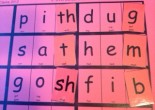
This video demonstrates how to use three bingo games currently available for $5 each on this website, which help early literacy learners with their blending skills.
As I find time to make more of these games working on consonant blends, vowel spellings and other patterns, I will add them to the shop.
Click here to go to the store and get one or more of these games.
Cheap Phonics Alphabet
0 Replies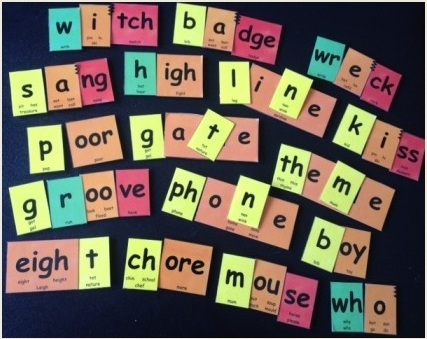
There is plenty of research to show that movable alphabets are a very effective literacy teaching tool.
This video clip shows you how to use the movable alphabet that's available from this website as a downloadable pdf which you print, laminate and cut up, so it's super-affordable and there's no waiting for it to arrive by post, plus you can make a set for home and one for school if necessary, for consistent teaching and practice.
This alphabet contains 100 spellings of either one, two, three or four letters. These are the main spellings in one-syllable words. There are additional spellings in longer words, but these are best avoided when working with beginners.
Each spelling includes example words, e.g. the spelling "oe" has the words "toe", "shoe" and "does" on it. These words are useful to remind teachers/parents and learners that most spellings are shared by more than one sound.
Click here to go to the store and get your copy.
Syllable chunking
2 Replies
As a child, I read about girls called Penelope in books, but didn’t know any Penelopes. I didn’t discuss what I was reading with anyone, so for a long time I thought the name “Penelope” only had three syllables.
To read and spell words of more than one syllable, you need to know how they sound, as well as what they look like, and be able to think flexibly about where the syllable breaks are. The word “same” seems a lot like the word “sesame” till you hear it.
Training wheels for real books
We really should put training wheels on long words for beginners, to help them see the internal patterns – same, se‧sa‧me, cite, re‧ci‧pe, an‧te‧lope, Pen‧el‧o‧pe – and remind them that a syllable can be one letter/sound or quite a lot of them: a‧re‧a, i‧o‧ta, mi‧nu‧ti‧ae, squelch‧ing, texts, caught. (more…)
Do we need spelling reform?
11 Replies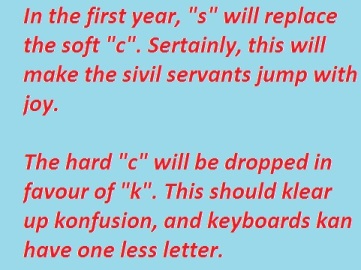
Every NAPLAN season there are complaints about English spelling complexity, calls for one-letter-for-each-sound spelling reform, and people wondering why we still bother with spelling, now we all have a spelling chequer that came with our pea sea.
Switching to a one-letter-for-each-sound system would mean huge changes, such as adding an extra 18 letters to our alphabet's 26 letters representing 44 sounds. Simplifying spelling would also mean losing the rich source of information about word meanings and origins embedded in our current spelling system.
Give Samuel Johnson a break
Famous smartperson Samuel Johnson published the first major English dictionary in 1755, thus stamping out the spelling rapscallionship of the likes of Shakespeare, who routinely spelt the same word two or three different ways in one sonnet, and his own surname 14 different ways.
Unfortunately Johnson didn’t then write another book explaining the logic behind his system, but it’s extremely well and carefully done, and deserves more understanding and appreciation. Or at least not quite so much slagging off.
Linking related words
For example, it seems crazy to have lots of words with “ea” for a sound that’s ordinarily just an “e”, like bread, breakfast, feather, weather and dead. Let’s change them to “bred”, “brekfast”, “fether”, “wether” and “ded”, and write “sez” instead of “says”, like rappers do.
Spelling list words
0 Replies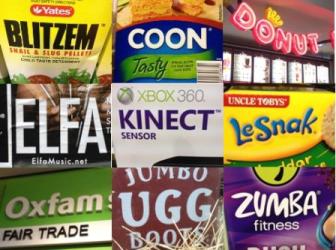
Spelling is traditionally taught as though there are a fixed number of words in the language, but many more words exist than those in dictionaries. We have words at the breakfast table, on street signs, on products and marketing materials, at the football, on maps, on the television, for example:
- people’s names – the first, last and nicknames of new people we meet, but also actors, characters, politicians, sportspeople, crime figures, daughters of deceased crocodile wranglers…
- the names of places – streets, towns, cities, countries, shops, heritage homes, amusement parks…
- pets – Fido, Oedipuss, Velcro, Genghis, Nemo…
- words that have been in the news – fracking, vuvuzela, slacktivism…
- words used in specific cultures or subcultures – burquini, gubbah, bestie, Emo, bromance, flashpacker…
- slang – brekkie, exy, nuddy…
- crazes – planking, tweeting, infomania, lolcats…
- businesses and brands – Rev, Nokia, Oshkosh, Nike, Pajero, Vegemite…
- words from history, science, astronomy, gastronomy, and other specialist fields – ziggurat, Aztec, kinetic, hygrometer, asteroid, galaxy, jus, evoo…
- words related to new ideas or inventions – googleganger, shockumentary, staycation, pescatarian, nettiquette…
Sounds and letters
5 Replies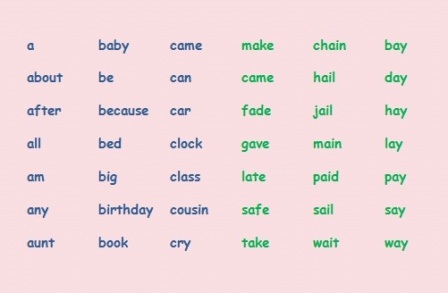
If you want to store a large, complex system such as the English spelling system in a finite human brain, you have to organise it well.
To organise something, you first need an organising principle or principles.
If you want to use the relationship between letters and sounds as your organising principle for spelling (and most sensible people do), you can start from the letters and work to the sounds, or start from the sounds and work to the letters.
Starting from the letters
There are 26 letters in the English alphabet, but English also has a whole stack of letter combinations that can represent individual sounds:
- Two letter combinations, like “oo” as in “book”, “er” as in “her”, “ph” as in “phone” and “ey” as in “key”
- Three letter combinations, like “igh” as in “high”, “dge” as in “bridge”, “tch” as in “catch” and “ere” as in “here”.
- Four letter combinations, like “eigh” as in “eight”, “aigh” as in “straight”, “augh” as in “caught”, and “ough” as in “bought”, “drought”, “dough”, “through”, “thorough” (but not “cough” or “tough”, where the “ou” and the “gh” represent different sounds, and just happen to be next to each other).
To add to the complexity, many letters and letter combinations can represent more than one sound, for example, the letter “y” represents four different sounds in the words “yes”, “by”, “baby” and “gym”. The spelling “ea” represents three different sounds in the words “beach”, “dead” and “break”.
Spelling rules
4 Replies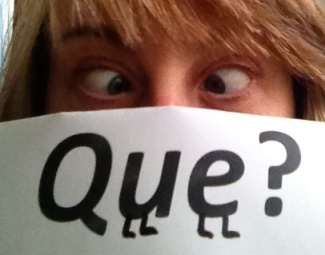
Heaps of books and internet sites will tell you that there are many spelling rules, and if you learn all the rules you will be able to spell.
For example:
Rule: “When two vowels go walking, the first one does the talking”
This means that when you have two vowel letters together in a word, you say the name of the first letter for both letters.
This works for words like sundae, rain, been, eat, seize, people, pie, boat, toe, brooch, soul, cue, nuisance and vacuum.
It doesn’t work for words like baa, maestro, said, plait, bonsai, fault, caution, aunt, deaf, great, vein, feisty, feud, friend, skiing, does, phoenix, boil, food, good, blood, loud, cousin, youth, and I could go on with this list for a very long time.
Spelling rules don't work
Once you start trying to use spelling rules, you find that even “I before E except after C” doesn’t work all the time. Witness rein, veil, sieve, surveillance, protein, counterfeit, sheila, seize, apartheid, eiderdown, kaleidoscope, poltergeist, seismic, leisure and heifer.


